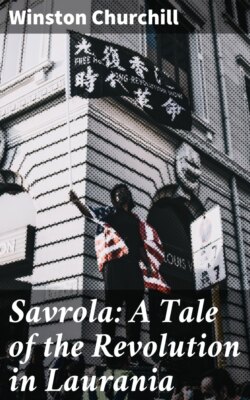Читать книгу Savrola: A Tale of the Revolution in Laurania - Winston Churchill - Страница 7
На сайте Литреса книга снята с продажи.
CHAPTER V. A PRIVATE CONVERSATION.
ОглавлениеTable of Contents
"That," said the President to his confidential secretary, so soon as the door had closed on the retiring deputation, "is over, but we shall have plenty more in the future. Savrola will most certainly be elected for the Central Division, and we shall then have the pleasure of listening to him in the Senate."
"Unless," added Miguel, "anything should happen."
The President, who knew his man well, understood the implication. "No, it is no good; we cannot do that. Fifty years ago it might have been possible. People won't stand that sort of thing now-a-days; even the army might have scruples. So long as he keeps within the law, I don't see how we can touch him constitutionally."
"He is a great force, a great force; sometimes, I think, the greatest in Laurania. Every day he grows stronger. Presently the end will come," said the Secretary slowly and thoughtfully, who, as the partner of Molara's dangers, no less than of his actions, had a claim to be heard. "I think the end is coming," he continued; "perhaps quite soon—unless——?" he paused.
"I tell you it can't be done. Any accident that happened would be attributed to me. It would mean a revolution here, and close every asylum abroad."
"There are other ways besides force, physical force."
"None that I can see, and he is a strong man."
"So was Samson, nevertheless the Philistines spoiled him."
"Through a woman. I don't believe he has ever been in love."
"That is no reason against the future."
"Wanted a Delilah," said the President dryly. "Perhaps you will find one for him."
The Secretary's eyes wandered round the room artlessly, and paused for a moment on a photograph of Lucile.
"How dare you, Sir! You are a scoundrel! You have not an ounce of virtue in you!"
"We have been associated for some time, General." He always called him General on these occasions, it reminded the President of various little incidents which had taken place when they had worked together during the war. "Perhaps that is the cause."
"You are impertinent."
"My interests are concerned. I too have enemies. You know very well how much my life would be worth without the protection of the Secret Police. I only remember with whom and for whom these things were done."
"Perhaps I am hasty, Miguel, but there is a limit, even between——" He was going to say friends but Miguel interposed accomplices. "Well," said Molara, "I do not care what you call it. What is your proposition?"
"The Philistines," replied Miguel, "spoiled Samson, but Delilah had to cut his hair first."
"Do you mean that she should implore him to hold his hand?"
"No, I think that would be useless, but if he were compromised——"
"But she, she would not consent. It would involve her."
"She need not necessarily know. Another object for making his acquaintance might be suggested. It would come as a surprise to her."
"You are a scoundrel—an infernal scoundrel," said the President quietly.
Miguel smiled, as one who receives a compliment. "The matter," he said, "is too serious for the ordinary rules of decency and honour. Special cases demand special remedies."
"She would never forgive me."
"The forgiveness would rest with you. Your charity would enable you to pardon an uncommitted crime. You have only to play the jealous husband and own your mistake later on."
"And he?"
"Fancy the great popular leader. Patriot, Democrat, what not, discovered fawning to the tyrant's wife! Why, the impropriety alone would disgust many. And more than that,—observe him begging for mercy, grovelling at the President's feet,—a pretty picture! It would ruin him; ridicule alone would kill him."
"It might," said Molara. The picture pleased him.
"It must. It is the only chance that I can see, and it need cost you nothing. Every woman is secretly flattered by the jealousy of the man she loves, even if he be her husband."
"How do you know these things?" asked Molara, looking at the ugly pinched figure and glistening hair of his companion.
"I know," said Miguel with a grin of odious pride. The suggestion of his appetites was repulsive. The President was conscious of disgust. "Mr. Secretary Miguel," he said with the air of one who has made up his mind, "I must request you not to speak to me of this matter again. I consider it shows less to the advantage of your heart than of your head."
"I see by Your Excellency's manner that further allusion is unnecessary."
"Have you the report of the Agricultural Committee for last year? Good,—please have a précis made of it; I want some facts. The country may be kept, even if we lose the capital; that means a good part of the army."
